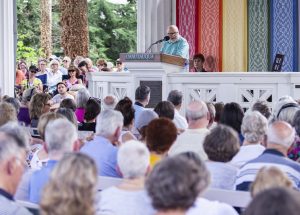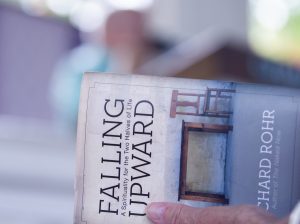
Even though people know that everyone dies, some people do not truly grasp the concept until death is upon them, said Fr. Richard Rohr, OFM.
“I’ve talked to some hospice workers and end of life care people, and they say a lot of people don’t get it until the last three days, three hours, even three minutes,” Rohr said. “The good thing — at least I’ve heard consistently — is most people do get it, what it means and what it doesn’t mean, because then you have no choice except to go for broke. The great surrender called death.”
Rohr, a Franciscan priest from the New Mexico Province and founder of the Center for Action and Contemplation in Albuquerque, New Mexico, concluded his lecture series in the Hall of Philosophy as part of Week Four’s interfaith theme, “Falling Upward: A Week with Richard Rohr.” His last lecture, presented on Thursday, was called “The Second Half of Life,” based on his book Falling Upward: A Spirituality for the Two Halves of Life.
“At the beginning of chapter 12, I start with a quote from the Dalai Lama, and he says, ‘Learn and obey the rules very well so you will know how to break them properly,’ ” Rohr said. “That’s at the heart of the matter.”
Rohr said that the second half of life is about knowing the rules and then realizing they no longer apply because they no longer work. This is the difference between knowledge and wisdom.
“Information itself can’t get you there,” Rohr said. “What wisdom is — one of the many wonderful definitions — is to know when the knowledge applies and when it doesn’t. It’s mercy; it’s compassion; it’s understanding.”
Rohr said that the first half of life is learning the Ten Commandments and following them, but by the second half of life, it is time to rely on one’s own judgement. That isn’t to say one should throw the Ten Commandments away, but they should also make decisions based on their own sense of morality.

“You’ll look like you’re coloring outside the lines, people who know the rules well enough to know when they don’t apply,” Rohr said.
Rohr said the real trouble, however, is people who arrive to the second stage of life not having learned and meditated on the Ten Commandments in the first half of life. Rather, they relied on their egos.
Rohr said that those who have relied on their ego grew up in the late 1960s and early ’70s.
Before the late 1960s, Rohr said people believed that through education and religion, rules would be followed and the world could be saved. Education and religion thus became a priority to everyone.
However, with stronger education and religious systems in place, Rohr said, countries with these systems helped produce World War II.
“And so, what our youngsters did in great part is throw out the whole thing,” Rohr said. “If there’s no order that works, let’s just live with disorder. So, we moved into a world of disorder after 1968.”
One way that Rohr tries to explain this to his students is with an illustration of three boxes. The first box is called “order” and represents the “conservative 1950s, law-abiding, church-going worldview.”
The second box represents the mid-1960s, when America began to involve itself in the Vietnam War; when people recognized that America’s largest sin was racism and started to address it; and when a cynical attitude toward authority, law and even some long-held truths developed. Rohr said this second box is called “disorder.”
“If you threw those out too, then the only absolute remaining was your own ego (structure) and you become the frame of reference,” Rohr said.
The second half of life is when one can put together in the third box — which is “reorder” — what is “good and essential” from the first and second boxes, Rohr said.
“Again, the Jewish prophets who modeled this, we called them radical traditionalists,” Rohr said. “They knew the tradition well enough to critique the present by the sources and the values and the documents of the tradition. That’s the only way you can reform anything.”
“That’s the good thing about being Catholic… if you get authority on your side they can’t touch you,” says Rohr.
— The Chautauquan Daily (@chqdaily) July 18, 2019
This reform is what takes place with the good and essential in the third box. And, to be able to handle such intricacies within the box, maturity in the second half of life is key.
“There is a common consensus on the direction of a mature person,” Rohr said. “In the second half of life, if you grow up without major dysfunction, major violence, major disillusionment, you will become less violent, more non-dual, more compassionate and more inclusive.”
Rohr said that a mature person can hold those two opposing forces — those two boxes — together and live with the contradictions. A person like this, Rohr said, will confront a dark period in the second half of life, according to Rohr’s colleague, Cynthia Bourgeault, an Anglican priest. Bourgeault, Rohr said, learned about this “dark period” from George Gurdjieff, the Russian mystic.
“Whenever there’s a new arising of consciousness, Gurdjieff says, a new quasi-consensus about how things are … he calls that holy arising, (in which) there will be holy denial,” Rohr said. “Then, Gurdjieff says you have to wait for a holy reconciling, and he describes it as an x-force. We would call it in the Christian world, grace. It’s a gift from God … and we’re in that period of waiting for the x-factor.”
Rohr said that this is a time of darkness, waiting for the x-factor, but those who wait and those who will receive it are those who do not need an answer for everything, who can hang in the “balance by unknowing.” These people, Rohr said, are modeling what is at the core of faith.
“The new idea that begins to be broadly received (is) holy reconciling,” Rohr said. “According to Gurdijeff, if you want to believe him, (reconciling) becomes the new holy affirming and we start all over again. … It’s not a straight line. It’s three steps forward, two steps backward, three steps forward, two steps backward.”
Rohr says, “In this time of darkness it feels like there’s not a lot of hope… the only people who have it.. are people who are somehow held by grace.”
— The Chautauquan Daily (@chqdaily) July 18, 2019
Rohr said that everyone will start all over again because there needs to be a new arising or consensus that continuously moves closer toward inclusivity and nonviolence, a worldview where “we don’t have to be imperial in right to be happy,” Rohr said.
Rohr then concluded the lecture with a poem by Thomas Merton. Rohr was first exposed to the poem while in retreat at Merton’s hermitage. The poem is called “When in the Soul of the Serene Disciple.”
“When in the soul of the serene disciple / With no more Fathers to imitate / Poverty is a success, / It is a small thing to say the roof is gone: / He has not even a house.
“Stars, as well as friends, / Are angry with the noble ruin. / Saints depart in several directions.
“Be still / There is no longer any need of comment / It was a lucky wind / That blew away his / halo with his cares, / A lucky sea that drowned his reputation. / Here you will find / Neither a / proverb nor a memorandum. / There are no ways, / No methods to admire / Where poverty is no achievement. / His God lives in his emptiness like an affliction.
“What choice remains? / Well, to be ordinary is not a choice: / It is the usual freedom / Of men without visions.”
The Gospel, Rohr said, is not idealism; it is utter realism. Everyone wants a “happily ever after,” which is understandable, but that isn’t how life works. One doesn’t get to create their second half of life, Rohr said.
“You just drop into it,” Rohr said. “Don’t take yourselves too seriously. Make sure you can laugh. … Laugh at yourself and let other people laugh at you. What it is to be a mensch, as the Jewish people say, a human being, (is to be) one who can hold together all the contraries, all the paradoxes, all the mysteries, even without understanding them.”
Rohr ends with, “Laugh at yourself, and let others laugh at you.” @RichardRohrOFM
— The Chautauquan Daily (@chqdaily) July 18, 2019




